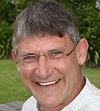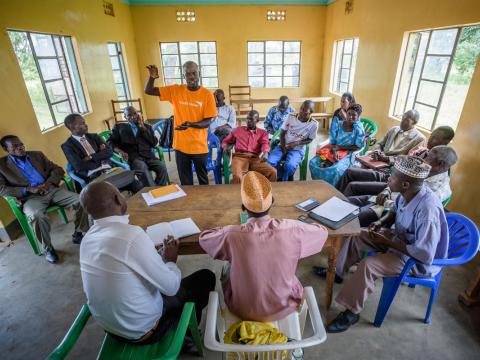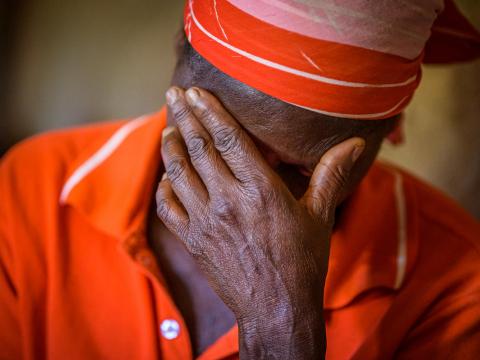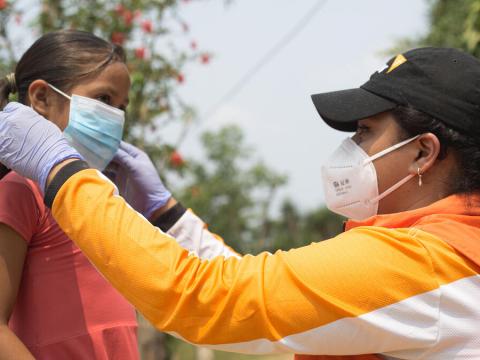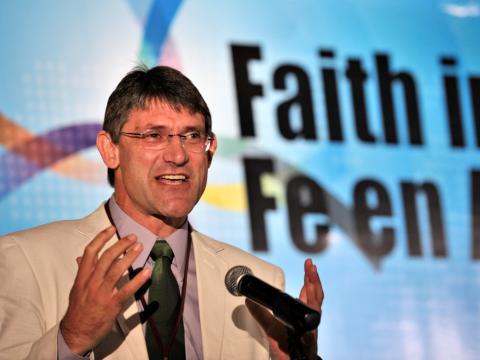
Suffering: When God shouts from within the silence
Christo Greyling explains how he learned that suffering can be a catalyst for meaning, and a motive to bring hope and transformation to others.
3 April, 2023
For some the start of a new year is a huge relief, a chance to put the pain and struggles of the previous 12 months behind them. But what if, like me, the start of a new year brought disaster--in my case the acknowledgement that my health and ability to work for World Vision is fading. What do you do with that? How do you respond?
Health challenges are nothing new for me. I was born with severe haemophilia, an inherited bleeding disorder. The absence of clotting factors in my blood caused repeated debilitating internal bleeding in my joints and muscles and left me blind in one eye. Growing up in South Africa, my treatment options were limited. So, I had to learn how to live with severe pain.
At the age of 16, just after I became a Christian, I asked my father, “If God is almighty, and listens to my prayers, why does He not heal my haemophilia?” A wise man, my father replied, “God answers all our prayers with yes, no, or wait a bit. Even though you may not know now which of these it is, going through the hardships you face is like climbing up a ladder. Every difficulty you lived through is like taking one step higher on the ladder. Eventually you will have a vantage point on life that others, who might have had it easier, will never have.”
In the years that followed and the decades since, I have reflected on his words and realised that he was right. Until this latest crisis, when it seems I forgot them.

Health decline
In my 20s, while at seminary, I was devastated to be informed that I had been infected with HIV and Hepatitis C. I was eventually cured of the Hep. C, but remain a haemophiliac and HIV positive. It was thanks to improved treatment and anti-retroviral medications (ARVs) that I have been kept healthy since 1998.
Yet, over the past four years, I have increasingly struggled with things we all accept as basic cognitive tasks: reading, writing, thinking, remembering. At first I thought I was imagining it. I told myself, “Just work harder. Put in more effort.” But my mental fog increased. I used every trick in the book to cope, but eventually they all failed. I was leaning heavily on my very supportive team members to take on some of my work, but I knew that was not sustainable.
I soon realised that I was neither imagining my challenges nor was I alone in this. Research has shown that an increasing number of long-term users of the life-saving ARVs are experiencing limiting cognitive issues as a result of the toxicity of the medications.
This discovery did not lessen my disappointment or discouragement. I felt like the prophet Elijah, who after his massive showdown on Mount Carmel, found himself sitting under a broom tree (1 Kings 19). I was burned out, depressed, alone and felt like an utter failure. My career and financial security were evaporating in front of my eyes.
Time to reflect
Christian writer Corrie Ten Boom said, “If God leads you onto rocky roads, He will always provide you strong shoes.” My ‘shoes’ were my friends and family who regularly checked in to provide support and pray with me during a time of extended sick leave, and my team mates who ensured my work was covered.
I spent my leave searching. For answers. For direction. For meaning. For God.
Like Elijah, I also heard God asking me, “What are you doing here, Christo?” In my lonely desperate hours I too wanted to cry out, “I am the only one left” (1 Kings 19:10). It is, I have come to realise, in such moments of vulnerability when God speaks most loudly. Not in an overpowering demonstration of power, or with amplified wonders, but in the silence.
During my time of extended sick leave, I tried to work on a memoir to capture my journey with haemophilia and HIV. Like Jacob wrestling with God at Jabbok, God used that process to remind me repeatedly of all the times He provided when I saw no way out.
When my denomination was not ready to start with an AIDS ministry in South Africa, an insurance company asked me and wife to develop a country-wide community AIDS awareness programme. When my health failed, and no ARVs were yet available, I miraculously became part of an experimental trial that pulled me through just long enough until the first ARVs were approved. When I was diagnosed with full-blown AIDS, and could not afford these drugs, an ARV trial became available. When the work with the insurance company became impossible, my paths crossed with World Vision. Out of that grew Channels of Hope, which continues to transform the lives of many faith leaders and their communities.

During this time of poor health, having forgotten my father’s sage advice, God ‘shouted’ at me in the overpowering silence: “I am who I am. I have never abandoned you. I am Emmanuel. I am with you now and always. I will be faithful now, and in the future, like I was in the past.” (Rom 8:35-39).
Lessons learned
Pain and suffering is part of our broken world. We will all experience it. Some more intensely than others. The question is: How will we react to it? I have learned that suffering can either trap you or set you free:
1. We risk getting stuck in our suffering or pain and letting them become our identity. But it should not determine our reality or limit our self-worth. We should wrestle with God, but remember that he understands our pain and even prays for us when we run out of words (Rom. 8 26-27)
2. Keeping a secret is lonely. Being vulnerable, dropping the mask with true friends and confiding in them how much you’re hurting is an act of courage. Ever since my HIV diagnosis in 1987 my friends did not try to teach me ‘what a friend we have in Jesus’; they demonstrated to me ‘what a Jesus we have in a friend’.
3. Our suffering, pain or difficult circumstances can offer an opportunity to become a catalyst through which others might find meaning, have hope and bring about transformation (2 Cor. 1:3-11).
4. Even though our circumstances may not change or improve, dare to have hope. Hope that things will change, or that something good will come out of suffering. For followers of Jesus that hope is anchored in the person of Jesus and what he has done for us (1 Peter 1:3-5)

I will, unfortunately, not be able to continue with the work I love within World Vision. My career, as I know it, has reached its end. But, in looking back, I was reminded that each desert time in the past was a preparatory stage for something new, unexpected and mostly also something surprisingly better, for me and those around me. I do not know what lies ahead for me, but I know God is already there offering hope.
I want to invite you to join me and live with hope in the midst of our struggles and pain. Suffering brings us an opportunity to take the next step on the ladder, raising us up higher. Climb with me, so we can see clearly what needs to be done to bring healing, meaning and hope to others.
Click here to learn more about Channels of Hope and here to learn more about World Vision’s faith and development work.
Christo Greyling is currently World Vision’s Senior Director, Church Partnerships and also an ordained minister in the Dutch Reformed Church. Christo co-developed the Channels of Hope methodology to equip 500.000+ local faith leaders and congregations to respond effectively to HIV/AIDS; maternal, newborn, and child health issues; child protection; gender and gender-based violence; and Ebola and COVID-19. He has served as a board member of HIV-focused NGOs such as INERELA+, an international network of religious leaders living with, or personally affected by, HIV/AIDS; the Christian AIDS Bureau for Southern Africa; and the Ecumenical Advocacy Alliance. He has a degree in theology and a master's degree in Public Health.
